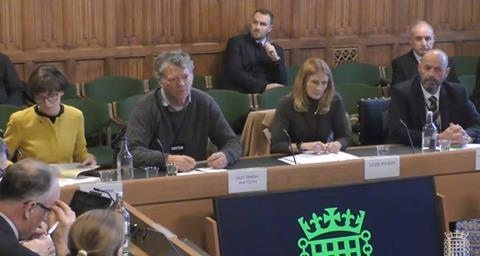British grower representatives urge EFRA Committee to help redress grower-retailer power imbalance and save sector from collapse

UK food producer representatives gave a damning indictment of British supermarket pricing and intimidation practices in an EFRA Committee meeting on 9 January.
They blamed the major multiples for driving UK farmers and growers out of business, and criticised supermarkets on several fronts when addressing the committee’s Fairness in the Food Supply Chain inquiry in Westminster.
Ali Capper, executive chair of British Apples & Pears, and Guy Singh-Watson, founder of Riverford Organic Farmers, were among seven expert witnesses from the UK food sector. They answered questions from the cross-party committee on a range of supply chain and production issues, including the balance of power between food producers and retailers.
The committee, chaired by Sir Robert Goodwill (Conservative MP for Scarborough and Whitby), heard how British fruit and vegetable growers are facing an existential crisis as their input costs have risen by 30 per cent over the last two years. Meanwhile, prices received from retailers remain more or less unchanged, according to the industry representatives.
Within the apple sector, Capper said growers have seen an eight per cent increase in returns received from supermarkets over the last two years, during which time Lidl’s red apple prices went up by 50 per cent, Morrison’s packs up 39 per cent, and Tesco’s Gala apple prices rose 36 per cent.
Singh-Watson told the committee that, according to a recent independent survey, 49 per cent of British fruit and vegetable growers expect to be out of business by next year as a result of low retail returns.
He spoke of a culture of fear in the sector whereby producers are afraid to speak out against unfair retailer pricing practices because, if identified, they will be delisted and lose supermarket business.
“We have this real imbalance in the sector whereby all the power is in the hands of the retailers,” he said. “I was the only person who could mount the [Get Fair About Farming] petition [to be debated in Parliament later this month] urging supermarkets to treat farmers more fairly because I don’t supply the supermarkets. Everyone else is too terrified.”
He added that while the Groceries Supply Code of Practice (GSCoP) has cleaned up the act of “the most dreadful parts of the grower-retailer relationship”, it hasn’t redressed the imbalance of power.
In her six recommendations to the committee, Capper appealed to the EFRA chair to write to the CEO of every major British retailer to call for a recognition of farm input inflation and fair pricing. “You may choose to make an implicit threat that, if they don’t, you will legislate for it,” she said. “And I would like you to call for long-term multi-annual contracts, and I would like you to say that suppliers need to make a profit.”
In her second recommendation, she called for government to impose a “fair-dealing clause on retailers” in terms of contract obligations around pricing mechanisms. “As a crop association, we will help,” she said. “We will provide the framework.”
Point three was that the industry needs to see the cap on seasonal workers removed and for the scheme be introduced for a minimum of five years. “Do you realise, the scheme ends at the end of this year?” she said. “How can I plan for my business not knowing whether there will be any labour next year?”
Government support for grower energy costs (by including horticulture in the Energy Trade Intensive Industry scheme), introducing carbon border adjustments on food imports, and amending the ELMs scheme so that it works with food production and not against it, made up the last three of her six recommendations.
To which Singh-Watson added a seventh: “Make the retailer practice of selling fictitious farm brands illegal.”
“In horticulture, we have very little branded veg [because retailers want own-brand produce], yet Tesco, for example, have eight ‘farms’ that they brand their produce from that doesn’t exist,” he told the committee. ”Their free-range chicken is from Willow farms, which is a figment of their imagination. This is clearly misleading the consumer.
”People want to know where their food comes from. My business is based on that. They are willing to pay more when they know where it come from. But if they are being hoodwinked, they are going to go for what’s cheapest, and this drives the price down and down and down.
“Make the practice of fictitious farm brands illegal. That would truly empower the consumer and drive improvements in our food chain and empower farmers.”
Andrew Opie, director of food & sustainability at the British Retail Consortium (BRC), defended supermarket buying practices.
He told FPJ: “Food retailers source, and will continue to source, the vast majority of their food from the UK and know they need to pay a sustainable price to farmers.
“Given the pressure on British farmers at the moment, retailers are paying more for their produce. However, retailers are also facing additional costs and are working incredibly hard to limit price increases for consumers during a cost-of-living crisis where many people are struggling to afford the essentials.”



